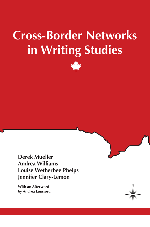RHET prof co-authors book on writing
Tue. May. 23, 2017
 Dr. Jennifer Clary-Lemon
Dr. Jennifer Clary-Lemon
(photo supplied)
Jennifer Clary-Lemon is an Associate Professor in the Department of Rhetoric, Writing, and Communications. In addition to her teaching and research, Clary-Lemon is the Director of the Department’s Tutoring Centre. From 2013-16, she served as a member of the Executive Committee for the Conference on College Composition & Communication, a national and international body which promotes and supports the teaching and learning of writing in universities and colleges, and prior to that (2010-13), as the editor of the journal “Composition Studies.”
Recently, Clary-Lemon co-authored a book, Cross-Border Networks in Writing Studies, with Derek Mueller, Andrea Williams, and Louise Wetherbee Phelps. According to Dr. Jaqueline McLeod Rogers, Chair of the Department of Rhetoric, Writing, and Communications, “this was a collaboration with an impressive group of cross-border writing scholars which examined writing program practices as well as formative webs of influence.” McLeod Rogers goes on to say that “Jennifer’s well-informed understanding of post-secondary writing instruction enriches her case-study assessment of our department—her chapter frames some of our important history, challenges and accomplishments.”
 About the book
About the book
“Cross-Border Networks in Writing Studies” coordinates mixed methods approaches to survey, interview, and case study data to study Canadian writing studies scholars. The authors argue for networked disciplinarity, the notion that ideas arise and flow through intellectual networks that connect scholars not only to one another but to widening networks of human and nonhuman actors. Although the Canadian field is historically rooted in the themes of location and national culture, expressing a tension between Canadian independence and dependence on the US field, more recent research suggests a more hybridized North American scholarship rather than one defined in opposition to “rhetoric and composition” in the US. In tracing identities, roles, and rituals of nationally bound considerations of how disciplinarity has been constructed through distant and close methods, this multi-scaled, multi-scopic approach examines the texture of interdependent constructions of the Canadian discipline (Parlour Press, 2017).
